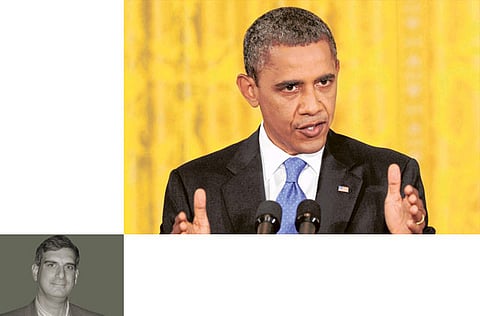Fearmongering over Arab Spring
Vitriolic Republican attitudes may further dilute Obama's tepid support for democracy in the region

The GOP & the Middle East: Lessons from the Campaign Trail
Voting for the Republican party's presidential nomination (finally) begins next week. That makes this a good moment to consider what this already-too-long campaign has taught us about the GOP and its attitude towards the Middle East.
Like most American political campaigns, the Republican race has devoted relatively little attention to foreign affairs. As the contest moves forward this is not likely to change.
When the Middle East does make it into political discussions these, predictably, tend to focus on the Israeli/Palestinian conflict, Iran and the Arab Spring with all three of those topics often being treated as aspects of the War on Terror — a term that President Barack Obama and his administration have worked hard to retire, but which many Republicans continue to embrace. Israel and Iran are the easy part. Throughout the campaign all of the GOP contenders, with the exception of Ron Paul, have competed with one another over the question of who loves Israel (by which they mean Prime Minister Benjamin Netanyahu and his government) the most.
It is important to understand that this pandering is aimed more at Christians than Jews. American Jews are one of the Democrats' most reliable voting blocs. Peeling them away from Obama's party has long been a GOP priority, but is a long-term project. The immediate job for the current candidates is to build support among right-wing Christians, a particularly important segment of the Republican electorate in two of the first three states to vote (Iowa and South Carolina).
This unquestioning support of the Likud party and its policies often gets mixed with Republican bellicosity regarding Iran. The Iranian nuclear programme and the existential threat it supposedly poses to Israel is taken as a given by many American politicians, not just Republicans. As a result every GOP candidate (again, excepting Paul) takes for granted the ‘need' for American military action (or support for any Israeli military action) against Iran should Tehran look like it might be close to manufacturing a bomb.
No candidate bothers to explain how a military strike would actually prevent Iran from building a nuclear device (as opposed to merely slowing it down). Candidates are also rarely asked to explain how they would deal with the political/military fallout from an attack on Iran; especially if — as many experts predict — the Iranian regime simply redoubled its efforts to build a bomb following any American or Israeli attack.
As bellicose as the Republican hopefuls are regarding Israel and Iran, their positions on those countries do not place them far outside of the American mainstream (what that says about mainstream US opinion itself is a separate discussion). It is GOP reaction to the Arab Spring that has really been interesting to watch.
Rabble-rousing
Among the party's presidential contenders, the general feeling appears to be that 2011's Arab revolutions are a bad thing. Several candidates have criticised Washington for failing to cling to Hosni Mubarak as his presidency crumbled last winter (though none have offered any workable ideas about what the US ought to have done instead). Newt Gingrich has called the Arab Spring "an interesting fantasy".
This dismissive, fearmongering attitude toward the Arab revolutions of 2011 ought to give thoughtful observers pause. The coming year will be critical for all of the region's still-unresolved revolutions, both those that appear to be moving forward in a positive way, such as Tunisia, and those, such as Yemen and Syria, that remain violent and far from a resolution.
As the world's sole superpower, America must find a way to engage positively with the ongoing movements pressing for change throughout the Arab world. It cannot do this if it opposes progress for fear of what democracy might bring, or because it views any change to the status quo as something that might aid terrorists.
The danger is not simply that know-nothings on the political right will advocate an unworkable policy of rolling back the clock, but also that during the coming year Obama will be forced to cut back his already tepid support for democratisation in the region for fear of being called weak during an election year.
Foreign policy wins few votes, but getting it wrong on the campaign trail can leave the winner — whomever that may be — facing bigger, longer-lived problems once in office. Both Obama and his opponents would do well to remember that as 2011 becomes 2012.
Gordon Robison, a longtime Middle East journalist and US political analyst, teaches political science at the University of Vermont.



